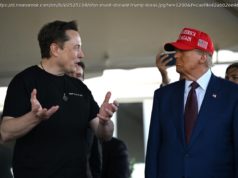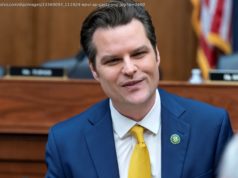North Korea has said it is still willing to sit down for talks with the United States
North Korea has said it is still willing to sit down for talks with the United States “at any time, at any format” after President Donald Trump abruptly cancelled his planned summit with Kim Jong Un.
Mr Trump blamed “tremendous anger and open hostility” by Pyongyang and abandoned for now a meeting that held the promise of a historic peace deal but also the risk of diplomatic meltdown.
North Korea issued a statement on Friday saying it is still “willing to give the US time and opportunities” to reconsider talks “at any time, at any format”.
Vice foreign minister Kim Kye Gwan called Mr Trump’s decision “unexpected” and “very regrettable”, and said the cancellation of the talks shows “how grave the status of historically deep-rooted hostile North Korea-US relations is and how urgently a summit should be realised to improve ties”.
In a letter to Mr Kim announcing his decision to back away from the June 12 summit, Mr Trump pointed to America’s vast military might and warned the rising nuclear power against any “foolish or reckless acts”.
The letter kicked off a day of mixed messages by the president, who declared hours later that “I really believe Kim Jong Un wants to do what’s right”.
Then, after that, a senior White House official said the North lacked judgment and had reneged on its promises ahead of the summit.
Mr Trump said from the White House that a “maximum pressure campaign” of economic sanctions and diplomatic isolation would continue against North Korea, with which the US is technically still at war, but he added that it was possible the summit could still take place at some point.
The president’s surprise exit capped weeks of high-stakes brinkmanship between the two unpredictable leaders over nuclear negotiating terms for their unprecedented sit-down.
Th US announcement came not long after Mr Kim appeared to make good on his promise to demolish his country’s nuclear test site.
But it also followed escalating frustration – and newly antagonistic rhetoric – from North Korea over comments from Trump aides about US expectations for the North’s “denuclearisation”.
The senior US official said the North violated a pledge to allow international inspectors to monitor the supposed implosion of the site on Thursday.
International journalists were present, but the US government cannot verify the site’s destruction.
Russian president Vladimir Putin, a staunch Kim ally, said the North Korean leader had in fact done “everything that he had promised in advance, even blowing up the tunnels and shafts” of his country’s nuclear testing site.
Mr Putin said of Mr Trump’s announcement, “In Russia we took this news with regret.”
Mr Trump, in his letter to Mr Kim, objected specifically to a statement from a top North Korean Foreign Ministry official.
That statement referred to US vice president Mike Pence as a “political dummy” for his comments on the North and said it was up to the Americans whether they would “meet us at a meeting room or encounter us at nuclear-to-nuclear showdown”.
Underscoring the high stakes, Mr Trump said he had spoken with military leaders, as well as Japan and South Korea, and stressed that the United States was prepared for any threat.
Still, Mr Trump’s announcement appeared to surprise South Korea, which had pushed to keep the summit on track as recently as Tuesday, when President Moon Jae-in met with Mr Trump in the Oval Office and said the “fate and the future” of the Korean Peninsula hinged on the talks.
The Blue House said on Thursday that it was trying to figure out Mr Trump’s intentions in cancelling the summit.
Mr Trump, who considers himself a master dealmaker, has confounded aides and allies at every turn of the fateful flirtation with the North.
He looked past the warnings of senior aides when he accepted Mr Kim’s invitation to meet back in March. He unveiled the date and the time with characteristic showmanship.
After initially projecting calm in the face of North Korea’s escalating rhetoric, he made a sudden about face, though his letter also waxed poetic about the “wonderful dialogue” emerging between the two leaders.
Mr Trump wrote: “If you change your mind having to do with this most important summit, please do not hesitate to call me or write.”
It was unclear whether Mr Trump’s move marked a negotiating ploy or a manifestation of mounting internal concerns over ensuring a successful outcome for the summit.
Mr Trump was briefed on Wednesday night and made the decision to exit on Thursday morning after consulting with top advisers, including Secretary of State Mike Pompeo and National Security Adviser John Bolton, to whom he dictated the letter, said the senior official.
The question now is how Mr Trump’s manoeuvring will be received.
His letter could make the situation worse in a society where saving face can be pivotal. Mr Kim might well take offence at the hard-nosed US approach after he released American detainees and destroyed a nuclear site.
Singapore said it regrets the cancellation of the summit that was to be held there next month.
A statement from Singapore’s foreign affairs ministry said it “hopes that the dialogue and efforts to find lasting peace and stability on the Korean Peninsula will continue”.
Japan said it understands Mr Trump’s cancellation.
Chief Cabinet Secretary Yoshihide Suga said the summit is useful only when it makes progress on the North’s nuclear and missile abandonment and on the issue of the North’s abductions of Japanese citizens.
Japanese foreign minister Taro Kono, in Mexico for talks with officials, said Japan expects a summit where North Korea can commit to denuclearise itself and said Japan will keep cooperating with Washington to achieve it.






